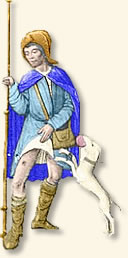"...Such fear and fanciful notions took possession of the living that almost all of them adopted the same cruel policy, which was entirely to avoid the sick and everything belonging to them. By so doing, each one thought he would secure his own safety.
Some thought that moderate living and the avoidance of all superfluity would preserve them from the epidemic. They formed small communities, living entirely separate from everybody else. They shut themselves up in houses where there were no sick, eating the finest food and drinking the best wine very temperately, avoiding all excess, allowing no news or discussion of death and sickness, and passing the time in music and suchlike pleasures. Others thought just the opposite. They thought the sure cure for the plague was to drink and be merry, to go about singing and amusing themselves, satisfying every appetite they could, laughing and jesting at what happened. They put their words into practice, spent day and night going from tavern to tavern, drinking immoderately, or went into other people's houses, doing only those things which pleased them. This they could easily do because everyone felt doomed and had abandoned his
 |
| A plague victim reveals
the telltale buboe on his leg. From a 14th century illumination |
In this suffering and misery of our city, the authority of human and divine laws almost disappeared, for, like other men, the ministers and the executors of the laws were all dead or sick or shut up with their families, so that no duties were carried out. Every man was therefore able to do as he pleased.
Many others adopted a course of life midway between the two just described. They did not restrict their victuals so much as the former, nor allow themselves to be drunken and dissolute like the latter, but satisfied their appetites moderately. They did not shut themselves up, but went about, carrying flowers or scented herbs or perfumes in their hands, in the belief that it was an excellent thing to comfort the brain with such odours; for the whole air was infected with the smell of dead bodies, of sick persons and medicines.
Others again held a still more cruel opinion, which they thought would keep them safe. They said that the only medicine against the plague-stricken was to go right away from them. Men and women, convinced of this and caring about nothing but themselves, abandoned their own city, their own houses, their dwellings, their relatives, their property, and went abroad or at least to the country round Florence, as if God's wrath in punishing men's wickedness with this plague would not follow them but strike only those who remained within the walls of the city, or as if they thought nobody in the city would remain alive and that its last hour had come."

No comments:
Post a Comment